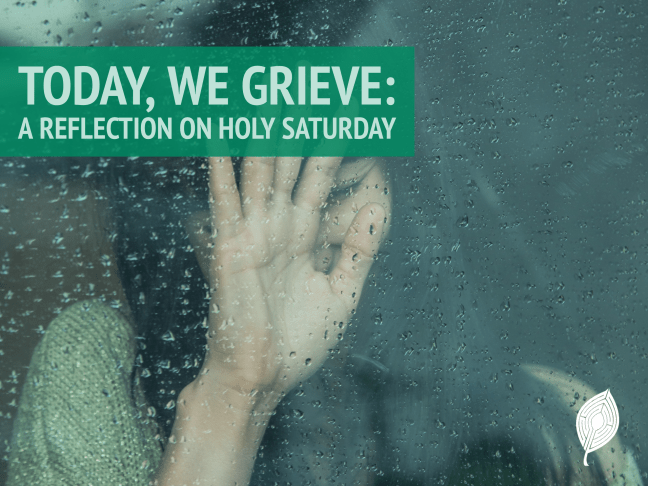Today we grieve.
Today we wail, scream, pound our fists and rend our garments.
Today we sit in silence and let the tears flow.
Today we make dinner and sweep the floor.
Today we grieve.
Yesterday’s drama — conspiracies of convenience, trials before kangaroo courts, crowds screaming for the other guy to be released in Jesus’ stead, those horrible hours on Golgotha — is over.
God is dead. Our Lord has been nailed to a piece of wood.
Today the world has stopped. The work of grief begins.
I hope we heed this opportunity.
If we look at the characters in the stories that take place in the aftermath of the crucifixion, we see that they all reacted differently in their grief, depending on their status, social expectations, their particular intersections of privilege and marginalization, and their relationship with Jesus.
Joseph of Arimathea, protected by both his position of power and the secrecy of his discipleship, offers a tomb for Jesus’ burial. Nicodemus, a wealthy man, provides the spices for his shroud. Jesus’ female disciples, motivated no doubt equally by custom and love, tend to the body. The apostles are in hiding, fearing for their lives, as known associates and possible accomplices of an enemy of the state.
What must they all have been thinking?
Think of Mary and Martha: Jesus had just raised their brother from the dead and now just a few days later, they are burying him. Why could he save Lazarus but not himself? Was it some twisted exchange, Lazarus’s life for his own?
Think of Jesus’ mother Mary: She had been visited by an angel, suffered the gossip and even mortal danger of being an unwed mother (saved from that fate only by Joseph’s honour), raised this boy whose birth had been surrounded by prophesying and the outpouring of the Holy Spirit, only to see him die, a short three years into his public life — Before he had accomplished anything the angel had foretold. Was it all for nothing? Did God fail?
Think of the apostles; They had all left behind their careers and families to follow Jesus, and now they find themselves criminals, hiding from the authorities in the upper room, their master dead.
How could this have happened? God, are you there? Do you even care?
For those of us who follow Jesus in this moment in history, it may feel like our worlds are colliding. For our grief over the death of Jesus rubs against our grief over the COVID-19 pandemic in some pretty raw ways. And we find ourselves asking similar questions: God where are you? How can this be happening? Do you even care?
Whether ours is the grief for a lost loved one or the subtler griefs of we all bear — the loss of our hopes for the year, postponed weddings, canceled funerals, failed businesses, the loss of simple freedoms — the grief is real.
And just as the loss and the grief impacted Jesus’ circle in different ways, so too are we all grieving in different ways. Some of us are keeping as busy as possible, others are doing as little as possible. Some of us are glued to our screens for the latest information, others need to shut off the news. Some of us are looking to find meaning, others just want to experience this as it is.
There’s no right or wrong way. The key is to remember that grief is a process and it’s a messy one at that. We’re all at different places and need different things right now. We need to be gentle with ourselves and with each other.
The other week, David Kessler, a globally recognized expert on grief, was interviewed on Brene Brown’s Unlocking Us podcast. When asked about the high rates of divorce following the death of a child, he said that in his experience it wasn’t grief that killed marriages, but judgment over each other’s grief that killed marriages. And I think we’re seeing a lot of this right now in our culture. There is so much judgment over how other people are managing this crisis. And, we just need to stop it. It’s not good for us, or for the those on the receiving end of our judgments. We need to let go of our judgments and just grieve in the best, fullest way we can.
I think that’s why I appreciate the spaciousness of Holy Saturday. It’s one thing pretty much all Christian traditions have in common. Holy Saturday is the one day in Holy Week and the ‘paschal triduum’ where the liturgical action more-or-less pauses. It’s a time to breathe. It’s a time to let us be where we are and feel what we feel. Wherever and whatever that may be.
And so, after all this, I don’t have much to say today. Simply this: whatever it is you need today, do it. Be good to yourself. Be gentle with yourself and with your friends and with strangers.
Today, we grieve.
And, tomorrow is a new day.


Thank you for this. It is definitely interesting to speculate. For some reason, I have always thought Simon Peter went and got drunk after denying Christ three times before sobering up over the Sabbath and taking charge. Mary and Martha probably argued a lot. Mary the Mother of God probably fussed a lot over John while Salome and the other women fussed over her.
Thank you for the reminder about judgement as well.
Have a blessed Easter!
LikeLike
Agreed on all of the above speculation! Hope you have a blessed Pascha/Easter/Eascha/paschter too!
LikeLiked by 1 person